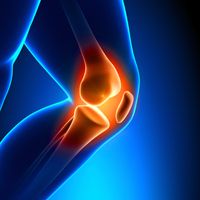Cartilage and its Role in Rheumatoid Arthritis
As any athlete or active person knows, the health of the cartilage in the knee can make the difference between comfortably moving around and pain that can stop you in your tracks. Researchers in Australia have recently discovered a stronger than expected link between knee cartilage and rheumatoid arthritis.

As any athlete or active person knows, the health of the cartilage in the knee can make the difference between comfortably moving around and pain that can stop them in their tracks. Researchers in Australia have recently discovered a stronger than expected link between that cartilage and rheumatoid arthritis (RA).
The study was conducted by a team at the Walter and Eliza Hall Institute to evaluate the SOCS3 protein and its role in controlling inflammation for patients suffering from RA.
“Autoimmune diseases such as rheumatoid arthritis are the result of the immune system wrongly attacking normal, healthy tissue,” said Tommy Liu, MD, in a statement. “Our study has shown for the first time that cartilage participates in the production of inflammation-signaling chemicals and contributes to its own destruction.”
During their research the team looked at suppressors of cytokine signaling molucules (SCOS) “that control the flow of chemical messages within and between cells regulate inflammation in rheumatoid arthritis,” the statement noted. It was during their research that they discovered that cells without SOCS3 showed greater tissue degradation.
“Without SOCS3, cartilage cells produced enzymes that drove tissue degradation and increased inflammation by releasing signaling molecules that triggered an increased autoimmune response,” Liu added.
The research also showed that a protein called RANKL that is produced by cartilage can contribute to bone remodeling. “These results show that cartilage is not an innocent bystander that gets damaged as a result of rheumatoid arthritis, but instead plays an active role in disease progression,” the authors wrote.
While there is no cure for the condition, Liu said the research could go a long way in helping devise new treatments. “Targeting the action of these inflammatory chemical messages could boost the efficacy of current treatments,” he noted.
The study was funded by the Reid Charitable Trusts, the Arthritis Foundation of Australia, the Australian National Health and Medical Research Council and the Victorian Government.